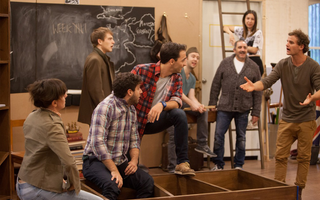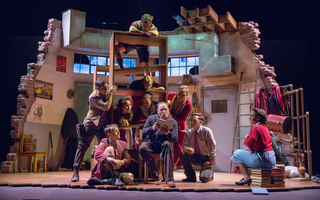Henry V
Once more unto the breach, dear friends, once more;
Or close the wall up with our English dead.
Henry V, Act 3, Scene 1
Henry V is the King of England. After the death of his father, King Henry IV, the young Henry is crowned King of England. Having shirked the irresponsible debauchery of his former days, he transforms from youthful rebelliousness into a proud leader and is committed to his new role of king. He decides to claim his right to the French throne after hearing the Archbishop of Canterbury’s persuasive arguments, and after the Dauphin sends him an insulting gift of tennis balls. After arresting the traitors plotting against his life, he marches on France. Henry is a gifted orator, and uses his rhetorical skill to motivate his troops and win political advantage. At Harfleur he inspires his men in battle through his famous “Once more unto the breach, dear friends” speech (Act 3, Scene 1). The night before the Battle of Agincourt, he disguises himself as a common soldier and asks his countrymen what they think of him. He finds the burden of kingship heavy and prays for success. During the next day’s battle, Henry has all the French prisoners of war killed. Having defeated the French, Henry arranges a treaty with the French, is named heir to the throne of France and courts and wins Princess Katherine of France.
Henry has been traditionally lauded as a fearless and inspiring leader, however is an incredibly complex character. In many ways, he is an example of an ideal Medieval king for his bravery and honour. However, his rejection of Falstaff, treatment of former friends and his execution of the French prisoners during the battle of Agincourt show an uglier side to his character. There has long been debate over Shakespeare’s depiction of Henry V: is he a valiant leader and war hero, or is he a violent and vainglorious ruler?
Chorus
O for a Muse of fire, that would ascend
The brightest heaven of invention,
A kingdom for a stage, princes to act
And monarchs to behold the swelling scene!
Prologue, Act 1, Scene 1
The Chorus acts as the mediator between the action of the story and the audience. Appearing at the beginning of all five acts, the Chorus narrates and comments on the action of the story. Crucially, the Chorus urges the audience to use their imagination to conjure the images and scenes that Shakespeare's play entails. This is most evocative in the opening prologue (“O for a muse of fire”) in which the Chorus asks the audience to imagine everything from "mighty monarchies” to “the vasty fields of France” to oceans and battlefields within the stage space or “This wooden O”, referring to the Globe Theatre. The Chorus is Henry’s greatest champion and apologist.
Katherine
Your majesty shall mock at me; I cannot speak your England.
Katherine, Act 5, Scene 2
Katherine is the Princess of France. After England defeats France, Henry demands Katherine as his wife - “Yet leave our cousin Katherine here with us: / She is our capital demand...” (Act 5, Scene 2) This is agreed to by the French King, making Henry Katherine's husband and heir to the French throne.
Katherine appears in two scenes of the play. In the first (Act 3, Scene 4), she is learning English with her maid, Alice, and makes humorous errors of pronunciation that to the English-speaking ear, sound like swear words. In the second scene (Act 5, Scene 2), she is wooed by Henry, who wins her hand in marriage.
During the wooing scene, Katherine expresses her feelings ambiguously. When Henry asks if she loves him, she responds, “Is it possible dat I sould love de enemy of France?” (Act 5, Scene 2). Henry has defeated her father, caused the death of her fellow countrymen, and laid claim to her country. In light of this, it is not surprising that she should be ambivalent. When she accepts Henry as her husband, Katherine only says that, if the marriage pleases her father, “Den it sall also content me” (Act 5, Scene 2). Again, her language does not make her feelings clear. Is she willingly accepting Henry, or does she simply recognise that she does not have much choice in the matter? The line can be played both ways. On stage and screen, Katherine is often played as initially reluctant or shy, but eventually a willing lover. In a play about the horrors and glory of war, Katherine’s scenes are often used to provide emotional and comic relief.
The Dauphin
In cases of defence ‘tis best to weigh
The enemy more mighty than he seems.
Dauphin, Act 2, Scene 3
The Dauphin is the prince of France and presented as a comic figure in the play. The Dauphin is confident and cocky, and delights in mocking Henry and the English forces. He consistently undermines and underestimates Henry V, dismissing his father’s fears that the English may prove more dangerous than they seem. The Dauphin triggers the war with England by sending Henry a mocking gift of tennis balls, a reference to the king’s rebellious and playful past.
In Act 3 Scene 7, the Dauphin’s immaturity and superficiality are revealed when he spends an inordinate amount of time on the eve of battle bragging about the prowess of his horse. During the Battle of Agincourt, as the French are clearly losing, the Dauphin enters and speaks his final lines in the play: “O perdurable shame! Let’s stab ourselves. / Be these the wretches that we played at dice for?” (Act 4, Scene 5).
Fluellen
I will be so
bold as to tell you I know the disciplines of war...
Fluellen, Act 3, Scene 2
Fluellen is a Welsh captain in Henry’s army and provides comic relief throughout the play. Shakespeare uses phonetic spelling to accentuate Fluellen’s Welsh accent, and to create humour around his mispronunciation of words. In Act 4, Scene 7, Fluellen refers to Alexander the Pig, instead of Alexander the Great (the Welsh ‘b’ is softer than the English ‘b’ and can sound like a ‘p’). Fluellen is obsessed with military strategy and correct procedure, although his logic and knowledge are often flawed. The term ‘Fluellenism’ is sometimes used to describe arguments where the conclusion is based on a random coincidence or correlation. For instance, Fluellen argues that Henry V is related to Alexander the Great, because both leaders were born in areas where there were rivers that had salmon in them.
Although Fluellen is presented as a comical character, he is not a two-dimensional one. Despite his pedantry, fiery temper, and flawed logic, he shows himself to be a brave and loyal soldier who loves and serves his country and king. In Act 4, Scene 1, Henry says of Fluellen, “Though it appear a little out of fashion, / There is much care and valour in this Welshman.”
Pistol
‘Sword’ is an oath, and oaths must have their course.
Pistol, Act 2, Scene 1
Pistol first appears in Henry IV Part 2, as one of Henry and Falstaff’s ne’er-do-well friends. His behaviour is often cowardly, and he displays a comical lack of understanding and wit. At the beginning of Henry V, it is revealed that Pistol has married Hostess Quickly. Throughout the play, he spends his time getting into fights, stealing, avoiding the battle, and wishing he were back home. Pistol has an ongoing dispute with Fluellen, who refused to defend Bardolph after he was condemned to death for stealing. In the final act of the play, Fluellen fights Pistol and forces him to eat a raw leek. Upon finding out that his wife has died, Pistol decides to become a “bawd” (pimp) and pickpocket, and to tell everyone that the scars he got in his fight with Fluellen were earned honourably in the war (Act 5, Scene 1).
Michael Williams
... few die well that die in a battle...
Williams, Act 4, Scene 1
Michael Williams is a soldier in Henry’s army, who only appears towards the end of the play. We learn very little about his character, but he provides an important platform for the discussion of some key questions in the play.
As Henry wanders the camp on the eve of battle, he encounters Williams and engages him in conversation. Williams is frustrated at the situation that King Henry has placed him and his comrades in; the English are vastly outnumbered and the likelihood that they will survive is low. Williams argues that the king is responsible for the eternal destiny of his soldiers. He claims that, if the soldiers die unworthily and their souls are damned, the burden of responsibility lies with the king who sent them to war in the first place: “if these men do not die well, it will be a black matter for the king that led them to it” (Act 4, Scene 1). Williams questions whether Henry’s war is just and suggests that Henry may not be trustworthy. Henry has refused to surrender and insists on fighting with his men, but Williams points out that if they lose the battle, Henry might be forced to surrender anyway: “when our throats are cut, he may be ransomed and we ne’er the wiser.” (Act 4, Scene 1). Williams is an important dissenting voice in the play, who presents arguments against the validity of Henry’s actions.







